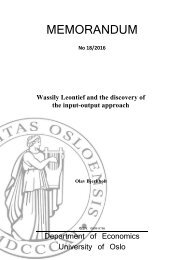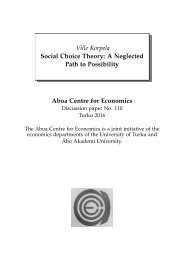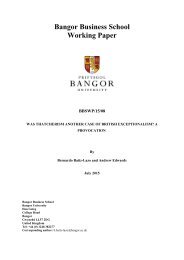Cheat Perish? A Theory Scientific Customs
n?u=RePEc:tut:cccrwp:2016-03-ccr&r=hpe
n?u=RePEc:tut:cccrwp:2016-03-ccr&r=hpe
Create successful ePaper yourself
Turn your PDF publications into a flip-book with our unique Google optimized e-Paper software.
Filename: scientificmisbehavior-proofreading-dbspaceAC2.pdf December 1, 2016<br />
Corneo, G. (1995). Social custom, management opposition, and trade union membership.<br />
European Economic Review, 39:275–292.<br />
Falk, A. and Fischbacher, U. (2002). “(c)rime” in the lab - detecting social interaction.<br />
European Economic Review, 46:859–869.<br />
Fanelli, D. (2010). “Positive” results increase down the hierarchy of the sciences. PloS one,<br />
5(4):e10068.<br />
Fang, F. C., Steen, R. G., and Casadevall, A. (2012). Misconduct Accounts for the Majority<br />
of Retracted <strong>Scientific</strong> Publications. Proceedings of the National Academy of Sciences,<br />
109(42):17028–17033.<br />
Feld, L. P., Necker, S., and Frey, B. S. (2014). Happiness of Economists. CESifo Working<br />
Paper Series No. 5099.<br />
Ferrer-i Carbonell, A. and Frijters, P. (2004). How Important is Methodology for the Estimates<br />
of the Determinants of Happiness? Economic Journal, 114(497):641–659.<br />
Fischer, P. and Huddart, S. (2008). Optimal contracting with endogenous social norms.<br />
American Economic Review, 98(4):1459–1475.<br />
Franzoni, C., Scellato, G., and Stephan, P. (2011). Changing incentives to publish. Science,<br />
333:702–703.<br />
Funk, P. (2005). Governmental action, social norms, and criminal behavior. Journal of<br />
Institutional and Theoretical Economics, 161(3):522–535.<br />
Gilpatric, S. M. (2011). <strong>Cheat</strong>ing In Contests. Economic Inquiry, 49:1042–1053.<br />
Gino, F., Ayal, S., and Ariely, D. (2009). Contagion and Differentiation in Unethical Behavior<br />
The Effect of One Bad Apple on the Barrel. Psychological Science, 20:393–398.<br />
Gneezy, U. (2005). Deception: The role of consequences. American Economic Review,<br />
95(1):384–394.<br />
Gneezy, U., Rockenbach, B., and Serra-Garcia, M. (2013). Measuring lying aversion. Journal<br />
of Economic Behavior & Organization, 93(0):293 – 300.<br />
Hoover, G. A. (2006). A game-theoretic model of plagiarism. Atlantic Economic Journal,<br />
34:449–454.<br />
John, L. K., Loewenstein, G., and Prelec, D. (2012). Measuring the prevalence of questionable<br />
research practices with incentives. Psychological Science, 23(5):524–532.<br />
Jones, T. M. (1991). Ethical decision making by individuals in organizations: An issuecontingent<br />
model. Academy of Management Review, 16(2):366–395.<br />
26





